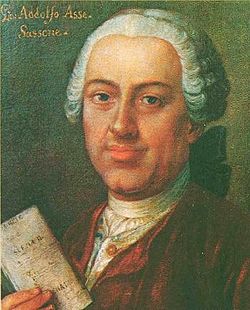Johann Adolf Hasse
German composer, singer and teacher (1699-1783) From Wikipedia, the free encyclopedia
Johann Adolf Hasse (also spelled Johann Adolph Hasse; baptised 25 March 1699 – 16 December 1783)[1] was a German composer, singer, and music teacher. He was an important opera composer in the 18th century.
Life
Early career
Hasse was born in Bergedorf, near Hamburg. His father and grandfather were organists. He studied in Hamburg from 1714 to 1717. In 1718 he joined the Hamburg State Opera. He was a tenor singer. In 1719, he started working in Braunschweig. He performed operas written by Georg Schürmann, Francesco Conti and Antonio Caldara. His own opera, Antioco, was performed in Brunswick in 1721.[1] It is his only opera which is written in the German language.[2]
He might have left Germany in 1722. He went to Naples.[3] In Naples, he converted (changed his religion) to Catholicism. He learned to write music and counterpoint with Alessandro Scarlatti.[4] Hasse's first opera in Italy was Il Sesotrate. It was performed on 13 May 1726.[1] The opera was a success. It made him a famous composer and musician.[2]
Dresden and Venice
In 1730 Hasse visited Venice. He married Faustina Bordoni, an opera singer. His opera Artaserse was performed there. It was his first opera which uses Metastasio's text. The opera was a success.[1]
He became the Kapellmeister of the Dresden court in around 1730. He arrived at Dresden in 1731. His employer was King August II of Poland.[1] He wrote operas and church music in Dresden.[5] In Dresden, he wrote the opera Cleofide. The opera uses text by Metastasio. Johann Sebastian Bach and his son Wilhelm Friedemann Bach may have watched the opera's first performance. On the next day, Bach performed on the organ. Hasse might have watched Bach play the organ. Carl Philipp Emanuel Bach said that his father and Hasse were good friends.[2]
As part of his job, Hasse did not have to stay in Dresden. From 1733 to 1734 he stayed in Italy. He wrote music for the Ospedale degli Incurabili, an orphanage in Venice.[6] He also went to Vienna. He taught Archduchess Maria Theresa of Austria how to sing.[4] Hasse came back to Dresden in December 1733. He wrote new operas. He also wrote some church music. In 1734, the king of Poland went to Warsaw. Hasse went back to Italy. He stayed in Italy until 1737.
He went back to Dresden in 1740. He wrote the operas Antigono and Ipermestra. The text for these operas were written by Metastasio. Hasse and Metastasio became good friends. They wrote many operas together.[1]
Last years
Hasse moved to Venice in 1773. He taught singing and wrote music for the Incurabili. He died in 1783. People forgot about him after he died.[1]
References
Other websites
Wikiwand - on
Seamless Wikipedia browsing. On steroids.

